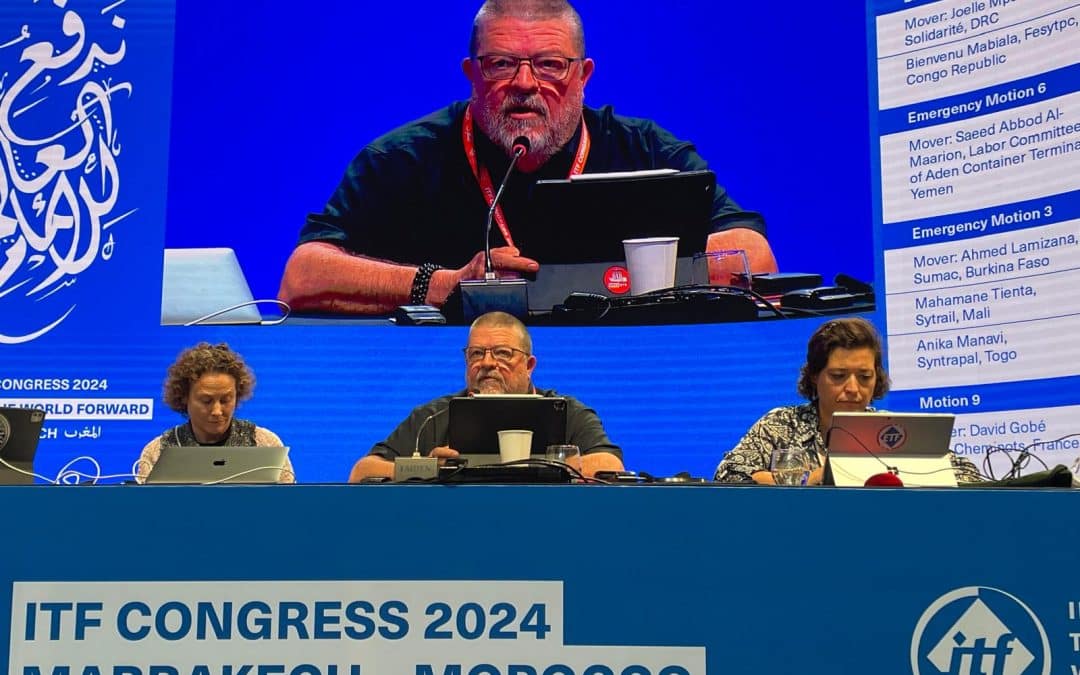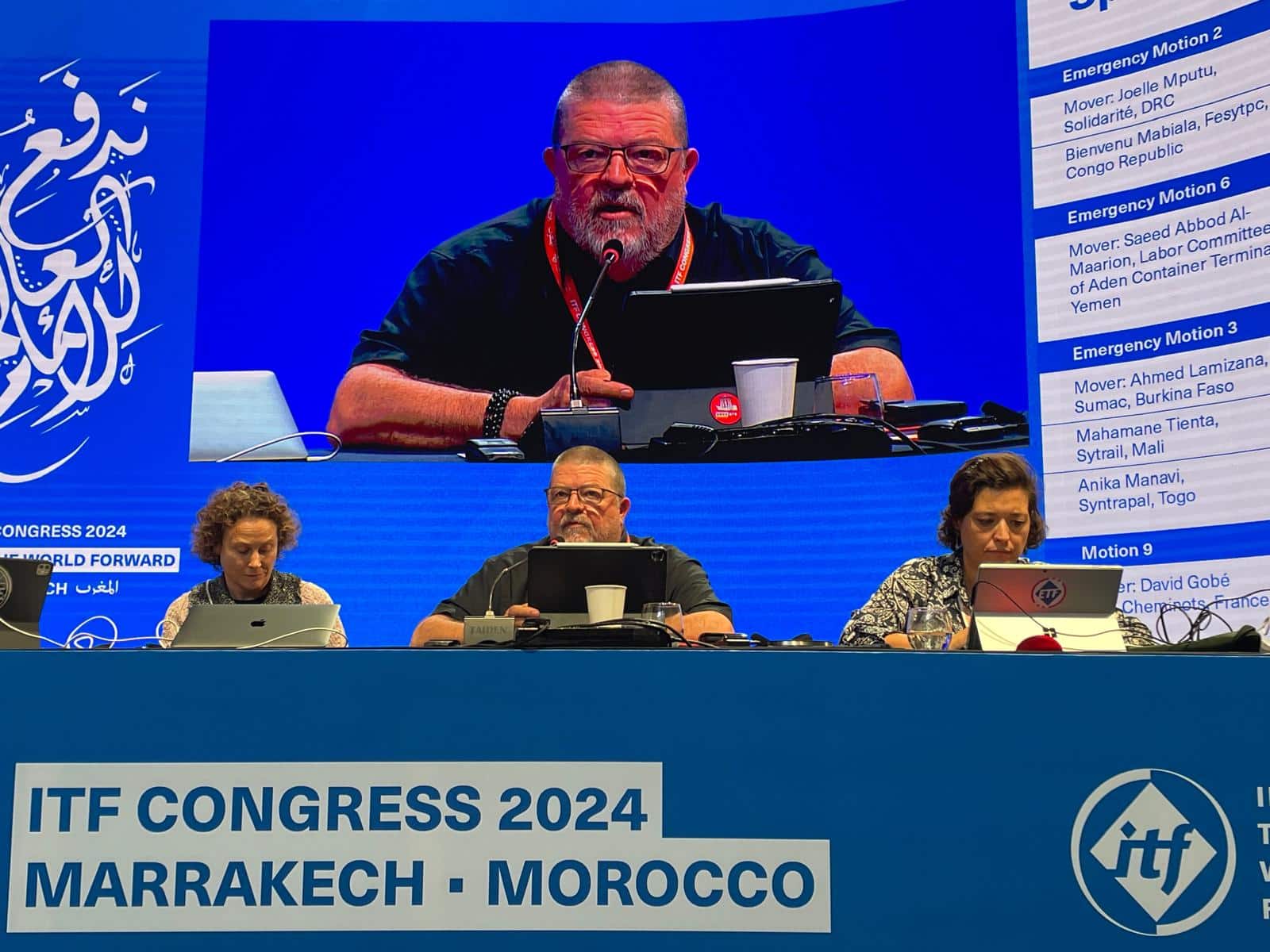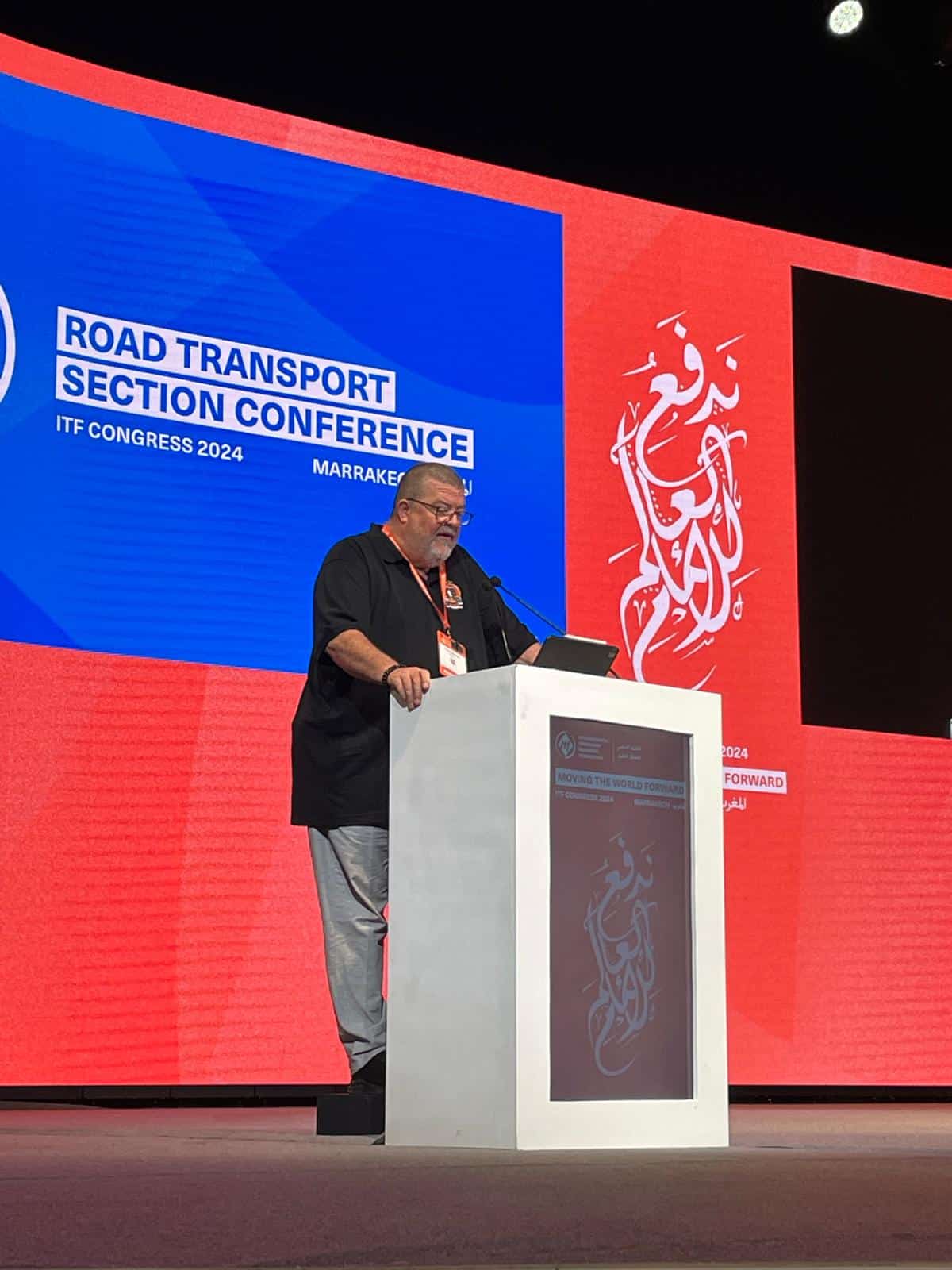
Discours au 14e congrès du CFDT-FGTE
Cher-e-s Collègues,
Cher-e-s Camarades,
J’ai le grand plaisir d’être présent aujourd’hui au 14ème congrès ordinaire de la CFDT-FGTE.
Pour ceux qui ne me connaissent pas :
Je m’appelle Frank Moreels et je suis le président de l’ETF, la Fédération Européenne des Ouvriers du Transport.
Le mois dernier, j’ai également été élu – ensemble et en duo avec Paddy Crumlin – pour la présidence de l’ITF, la Fédération Internationale des Ouvriers du Transport. Début 2027 je prends officiellement le relais comme Président.
Mais le plus important c’est que je suis et je resterai pour le reste de ma vie un militant syndical, comme vous tous !
L’ETF représente plus de 5 millions de travailleurs du transport dans 38 pays européens, affiliés à plus de 200 syndicats.
L’ETF défend les intérêts des travailleurs qui gagnent leur vie à la fois dans l’aviation civile, le transport routier, le rail et les secteurs maritimes tels que les ports, la navigation intérieure, la marine marchande, la pêche, le tourisme et les transports publics urbains.
Je suis particulièrement heureux de pouvoir vous adresser la parole aujourd’hui, parce que votre syndicat prend vraiment au sérieux l’engagement international. Contrairement à d’autres syndicats qui parlent beaucoup de solidarité internationale, votre organisation met vraiment en oeuvre la solidarité internationale, aussi bien en participant dans les instances gouvernantes de l’ETF et de ITF, mais aussi quand il s’agit de faire des propositions, de mobiliser.
Céline Ruffié, qui est co-présidente du comité des jeunes de l’ETF, et qui est membre du comité de management de l’ETF, a également récemment été élue membre du comité exécutif lors du congrès de l’ITF à Marrakech. Vous pouvez être fiers du travail de votre syndicat à l’ETF tout comme à l’ITF.
Et je suis particulièrement heureux de cet engament international, parce que beaucoup des défis avec lesquels sont confrontés les travailleurs du transport
sont par définition des problèmes qui doivent être adressées au niveau international.
Parlons par exemple des défis climatiques. Je ne peux pas m’imaginer qu’il y ait encore des gens qui continuent à faire l’autruche et à nier la crise climatique. Voir ce qui se passe actuellement en Espagne. Bien sûr, le secteur des transports est pointé du doigt comme l’un des principaux pollueurs.
Le trafic de marchandises par route, par avion, etc. laisse une grande empreinte écologique.
Pour éviter la crise climatique, les gouvernements et les employeurs devront consentir d’importants investissements pour arriver à un secteur du transport durable.
Mais une chose est sûre : ce ne sont pas les travailleurs du secteur des transports qui doivent payer la facture. Et donc nous devons nous manifester à ce niveau-là, vis-à-vis de l’Europe, vis-à-vis des employeurs pour défendre les droits de nos affiliés. Tout en sachant que le transport peut aussi apporter des solutions pour la crise climatique.
Un transport en commun efficace et abordable pour les utilisateurs est une des solutions pour la crise climatique que nous vivons.
Donc notre message doit être clair : au lieu de désinvestir dans le transport en commun, au lieu de privatiser et de libéraliser, nous voulons des investissements.
Et je peux donc vous dire aujourd’hui que quand vous, les syndicats français, allez passer à l’action le 21 novembre, pour protester contre le démantèlement de la SNCF fret, que l’ETF sera à vos côtés. Que l’ETF sera solidaire avec vous, car votre combat est tout aussi bien notre combat !
Autre priorité syndicale est la montée de l’extrême droite. Des parties populistes et de la droite extrême prennent de plus en plus d’ampleur.
Dans mon pays nous avons depuis quelques semaines pour la première fois depuis la deuxième guerre mondiale un fasciste qui est devenu maire d’une ville en Flandre. 22 % de la population au Nord du pays vote pour l’extrême droite.
Mais en France vous aussi êtes familier avec un Rassemblement National qui est un danger réel pour votre démocratie. Je tiens à vous féliciter pour votre mobilisation lors des dernières élections législatives pour éviter que la France ne rejoigne les rangs des nombreux pays européens où l’extrême droite a su entrer dans un gouvernement pour imposer sa politique d’exclusion.
Après tout, nous pouvons tous constater les conséquences désastreuses pour les travailleurs de l’arrivée au pouvoir d’un gouvernement d’extrême droite. Et pas seulement pour les travailleurs, mais aussi pour nous, les syndicats, qui devons défendre les droits des travailleurs.
Sans le droit de grève par exemple, les syndicats sont déjà à moitié ailés.
En fait, mon syndicat l’UBT avec la CFDT et cinq autres syndicats ont déposé une motion au congrès de l’ITF pour une “tolérance zéro pour l’extrême droite”, motion qui a été approuvée à l’unanimité par tous les membres du congrès.
Nous continuons donc, de mettre en garde nos affiliés contre les dangers de l’extrême droite, qui gagne pas par pas du terrain dans de nombreux pays.
Cela m’amène enfin au troisième grand défi auquel nous sommes confrontés : l’intelligence artificielle, l’automatisation et la numérisation.
J’ai été très heureux de lire dans le programme de votre congrès que vous organisiez une table ronde sur ce thème pendant ce congrès.
En effet, en tant que syndicat, nous ne pouvons pas nous tenir à l’écart. Car l’intelligence artificielle risque de bouleverser notre secteur du transport, et nous devons donc nous imposer en tant que syndicat pour défendre les droits des travailleurs.
Nous devons veiller à ce que les travailleurs ne deviennent pas les dindons de la farce et aient la possibilité de se perfectionner et de suivre des formations continues, car, même si tous nos emplois ne disparaîtront peut-être pas, l’organisation de notre travail et le contenu de notre boulot changera profondément.
Nous devons préparer les travailleurs à cette évolution. Pas seulement les jeunes, mais aussi ceux qui travaillent dans ces secteurs depuis des années.
Outre ces trois défis, il y a deux autres points de travail très importants pour moi personnellement dans les secteurs du transport, à savoir la présence des femmes et des jeunes.
Nos secteurs de transport ne sont pas encore suffisamment favorables aux femmes, en partie à cause de l’environnement de travail rude, des comportements machistes encore fréquents et des conditions de travail mal adaptées. Je pense par exemple au manque d’installations sanitaires pour les femmes.
Il faut aussi encourager davantage les jeunes à travailler dans les secteurs du transport. Et cela ne peut se faire qu’en garantissant de meilleures conditions de rémunération et de travail, un meilleur équilibre entre vie professionnelle et vie privée, …
Nous voulons faire du secteur des transports un environnement de travail où il n’y a pas de place pour la discrimination à quelque niveau que ce soit. Ce n’est qu’à cette condition que nous parviendrons à un secteur des transports où le respect des travailleurs est l’une des priorités.
Je fais un appel à vous, les militants de la CFDT-FGTE. L’ETF est en train de préparer une grande mobilisation Européenne pour mars de l’année prochaine.
Une mobilisation pour exiger haut et fort un secteur du transport « fair » et juste avec de meilleures conditions de travail et des salaires convenables pour tous les travailleurs du transport, partout en Europe !
Je compte sur vous, les amis !
Développer un rapport de force syndical au niveau européen ou international n’est pas chose facile ! Parce que nos affiliés ont des cultures syndicales biens différentes, des traditions qui ne sont pas les mêmes, des inspirations ou des convictions politiques qui peuvent différer !
Mais nous n’avons pas le choix chers ami-e-s. Il faut que nous travaillons ensemble. Il faut que nous nous unifions et que nous laissons nos différences dernières nous afin d’être plus forts vis-à-vis des employeurs et des politiques. Parce que eux, ils veulent que nous passons notre temps et investissons nos efforts à nous battre entre nous. Eux ils veulent que nous soyons divisés. A nous de ne pas tomber dans ce piège. A nous de forger un front syndical fort et uni au niveau de l’Europe. A nous de surmonter nos différences. Parce que ensemble on est plus fort !










